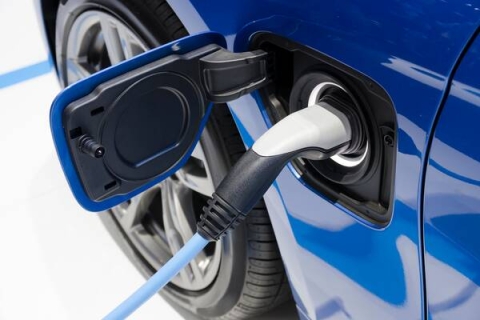

A University of Portsmouth researcher is part of new project that aims to alleviate the demands on the electricity grid due to the oncoming rise in electric vehicle (EV) usage
8 November 2022
2 min read
Dr Chris Jones, an applied psychologist at the University of Portsmouth, is part of the Future Electric Vehicle Energy Networks supporting Renewables (FEVER) project that will explore ways to relieve the pressure with fully grid-independent, renewably powered charging hubs.
The charging hubs will use renewable energy storage technologies to provide green electricity to EVs 24 hours a day, seven days a week, without taking a single kilowatt from the national grid.
As well using renewable energy sources, such as wind and solar power, the hubs will also incorporate an off-vehicle energy store (OVES) that will store the green power until it is needed.
The £6.6m project will see economists, engineers and social scientists from the Universities of Portsmouth, Southampton, Surrey and Sheffield work together to investigate the technical, economic, policy and public acceptance of these new EV charging stations.
It marks the first time engineers will have worked closely with social scientists and economists to develop a real-world charging solution of this kind.
This project represents another important step towards a greener future
Dr Chris Jones, Applied psychologist
Dr Jones, who has expertise in public perceptions of energy technologies and environmental change, said: “This project represents another important step towards a greener future. Crucially, it is a project that seeks to embody a responsible approach to research and innovation; one that recognises the value of understanding and integrating the opinions of end-users and prospective host communities into the decision-making that is taking place in relation to the technology design and its deployment.”
The five-year FEVER project, which is funded by the Engineering and Physical Sciences Research Council (EPSRC) started last month. By the fourth and fifth year of the project, FEVER aims to deliver and operate two demonstrator EV charging hubs capable of charging between six or eight EVs.
The core FEVER research team from the universities of Portsmouth, Southampton, Sheffield and Surrey is supported by 11 project partners from industry and related research groups including Shell, Siemens, Supergen Storage Network+, the Centre for Research into Energy Demand Solutions (CREDS), Cenex, GS Yuasa Battery (UK), Connected Places Catapult, Hive Energy Limited, The Faraday Institution, Wood plc and Dialogue Matters.
